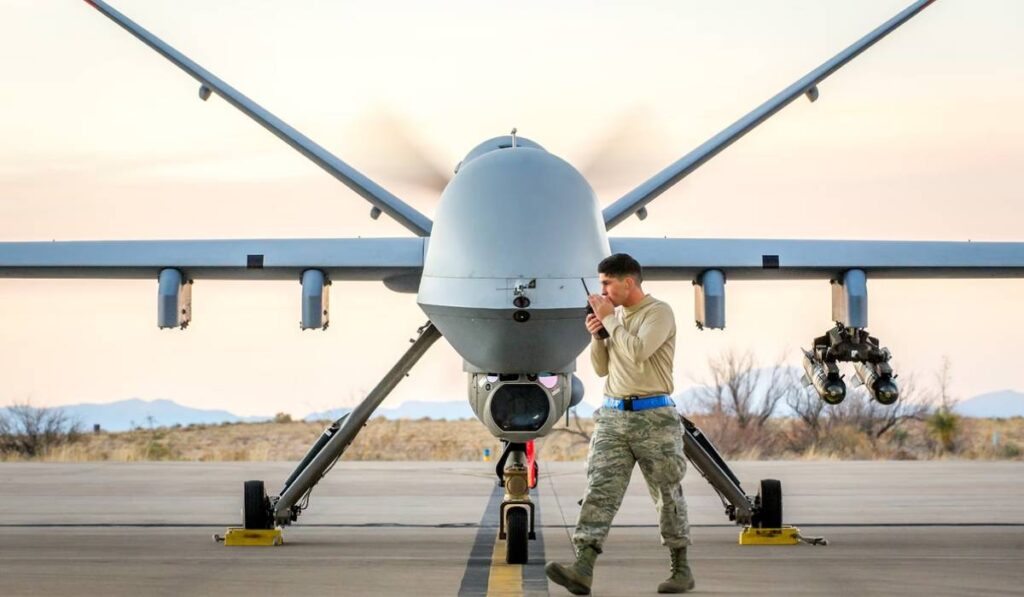
There’s one rule about the US that many foreigners know. Don’t mess with the citizens. One Iran-backed militia came to that realization too late on February 7, when they met death in a drone strike. The order came from the White House, a response to a deadly attack on an American base last month.
The group’s leader belonged to Kataib Hezbollah. According to the Pentagon, he was “responsible for directly planning and participating in attacks on US forces in the region.” The outfit also said, “The United States will continue to take necessary action to protect our people.”
According to its statement, there appeared to be no collateral damage or civilian casualties from the strike. Kataib Hezbollah identified the target as Abu Baqer Al-Saaedi. The Iraqi government is not happy with the strike. It has promised to strengthen Baghdad’s resolve to get US forces out of the country.
“Set your clocks for revenge time,” Kataib Hezbollah said on Telegram. The Shiite paramilitary group is behind the drone attack in Jordan in January. The attack killed three American soldiers and wounded dozens.
ALSO READ: California Rep. Tom McClintock Tanks Mayorkas Impeachment Vote
They were the first US troops to die in an attack since the Israel-Hamas war started on October 7, roiling the wider Middle East. US bases in Syria and Iraq have endured assault more than 100 times since then by Iran-backed groups using missiles and drones.
In response, the US has been striking back at the militants. Kataib Hezbollah, which roughly translates from Arabic as Brigades of God, previously promised to suspend operations against the US in the aftermath of the Jordan deaths.
Some analysts think that was proof Iran had pressured them to avoid escalating tensions with Washington any further. The commander was traveling in a car when he was hit and was the sole target. However, according to a US official, there may have been other people in the vehicle.
POLL — Should Donald J. Trump Be Allowed to Run for Office?
The US also launched heavy strikes on Iranian-linked targets in Iraq and Syria late last week as part of its response to the Jordan base attack. American officials have dubbed the strikes as the start of a more aggressive campaign against militants whom Tehran provides money and training.
The violence underscores the high risk of the fallout from the Israel-Hamas war worsening. The US says it’s trying to prevent that very outcome, but it is no easy feat.
For now, global markets seem confident in the US’s ability to contain the tensions and avoid a direct confrontation with Iran. Brent crude is up 4% this year but remains only slightly above $80 a barrel. No oil or natural gas production in the Middle East has yet been affected.
In other news, the US has also been targeting Iran-backed Houthi militants in an attempt to stop their attacks on ships around the southern Red Sea. While the Houthis are still assaulting vessels with drones and missiles, the US says its strikes have reduced the group’s firepower.
ALSO READ: Trump’s New York Civil Fraud Ruling May Spell Financial Ruin
So far, President Joe Biden has refused to conduct attacks on Iranian territory despite pressure from Republicans to do that. The US airstrikes in Syria and Iraq last week targeted elements of Iran’s Quds Force. They are part of the Islamic Revolutionary Guard Corps and responsible for handling many of Tehran’s relations with proxy groups.
You Might Also Like:
NORAD Detects Russian Aircraft in US Airspace
Taylor Swift Continues Record-Breaking Sold-Out Tour in Tokyo
California Lawmakers Pass “Daylighting” Law to Reduce Pedestrian Fatality
FBI Arrests Self-Touted Militia Sniper Planning to Attack People at the Southern Border
Rescue Crews Search for Missing Marines After Discovering Military Helicopter in California Forest
